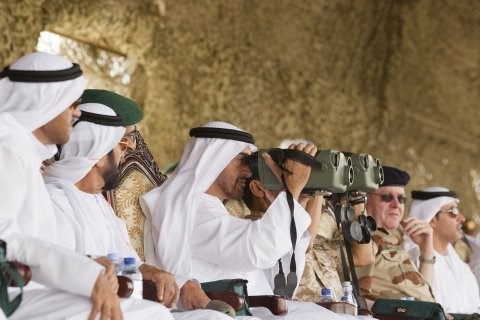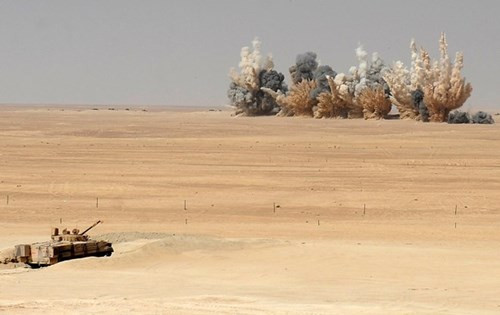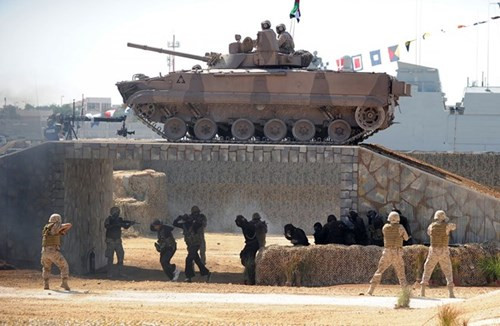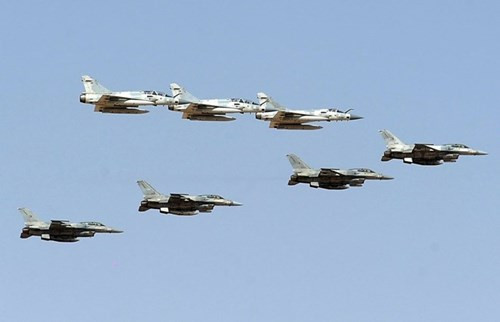The world's most powerful but "secretive" military force
A country that rarely appears on the international stage possesses sophisticated weapons, implements compulsory military service and is always ready to use its military across the region. That is the UAE.
 |
| Crown Prince Mohammed Bin Zayed Al Nahyan of Abu Dhabi watches the closing ceremony of a joint military exercise between the United Arab Emirates and France in the Abu Dhabi desert on May 2, 2012. |
A country that once had little presence on the international stage is acquiring sophisticated weapons, implementing compulsory military service and developing a fleet of fighter jets and heavy trucks.
A country of less than 10 million people but is said to be always ready to use its military throughout the region.
The biggest sign of this came in August, when the UAE joined Egypt in bombing Islamist forces trying to seize the Libyan capital. The UAE contributed 12 aircraft to the international campaign to overthrow Muammar Gaddafi in 2011. That same year, it contributed troops to the multinational force that crushed the uprising in Bahrain, and the country has also joined operations against the Islamic State group.
In 2013, the UAE ranked 15th among the world’s biggest military spenders, according to the Stockholm International Peace Research Institute. Its military spending has nearly doubled over the past decade. And it has the second-largest defense budget among the Persian Gulf’s oil giants, at $14 billion, after Saudi Arabia.
The UAE is on track to become the world's third largest importer of defense equipment by 2015.
A network of monarchical city-states including Dubai and Abu Dhabi is now building up its military power in the Middle East.
 |
| A United Arab Emirates (UAE) F-16 fighter jet releases a missile during a joint military exercise with the French army in the Abu Dhabi desert on May 2, 2012. |
The UAE has backed up its military deployment with an assertive foreign policy and independent thinking.
Neither Egypt nor the UAE gave the US advance notice of the airstrikes against the Islamic State in Libya. AFP reported that the attacks “signaled a direct step by Arab states that have previously fought proxy wars in Libya, Syria and Iraq for power and influence.”
At the same time, the US and its ally the UAE joined the fight against IS. It was one of five Arab countries involved in the air campaign against the group and allowed Australian fighter jets to fly over its territory. The US also based its aircraft at Al Dhafra Air Base, outside Abu Dhabi.
The UAE is also involved in intelligence operations to prevent the growth of IS. Last week, Foreign Minister Sheikh Abdullah bin Zayed al-Nahyan warned of the potential for increased links between IS and the terrorist group al-Shabab, an Al Qaeda affiliate in the Somali Peninsula.
“As groups like Daesh (IS) develop ties with criminal networks and arms networks like al-Shabab, we need to prevent them from expanding their maritime activities and threatening vital waterways like the Strait of Hormuz, the Red Sea, Bab al Mandab and the Gulf of Aden,” Zayed al-Nahyan said at an anti-piracy conference in Dubai.
 |
| Members of the UAE armed forces attend the opening ceremony of the International Defence Exhibition (IDEX) on February 17, 2013. |
The UAE, Egypt, Saudi Arabia, and Kuwait are still negotiating to form a coalition that “does not intend to intervene in Iraq or Syria, but will act separately to target other extremist hot spots,” according to the AP. An unnamed Egyptian military officer said conflicts were brewing in Libya and Yemen, where Shiite Muslim forces have taken over the capital.
Iran may actually explain why the UAE has been building up its military so rapidly.
Most people know the UAE as an economic powerhouse, with Dubai being a global financial center. It also has oil and gas fields and some of the busiest ports in the Middle East. But just across the Persian Gulf is Iran, which has a number of border disputes with the UAE to resolve.
The UAE has purchased several new ships and aircraft from the US, including an upgraded version of the F-16 fighter jet that it touts as the most advanced version of the aircraft in service around the world. In addition, the UAE is eyeing the fifth-generation F-35 fighter jet, which could give the UAE superior military capabilities over its larger, more geopolitically meddlesome neighbour.
The UAE could also use the time spent preparing its military to plan for a boost in prestige and prestige in the wider global community. This may explain why Abu Dhabi is so keen to be celebrated for its national pride: space exploration. In July, the country announced the creation of a space station by 2021 and plans to send a probe to Mars.
 |
| Mirage 2000 (France) and F-16 (US) of UAE forces participate in a joint military exercise with the French army in the desert of Abu Dhabi on May 2, 2012. |
But the UAE should also look a little closer.
The Arab Spring has demonstrated that no leader in the region can be completely assured of internal conflicts and that the Middle East's political and security environment can fluctuate in unpredictable ways.
The UAE has used internal repression to shore up the situation in troubled regions, arresting dozens of Islamist activists and expelling secular opposition leaders such as the leader of the “Arab Spring” revolution, Iyad al-Baghdadi.
The country’s conservative leaders see Islamists as a threat to the current regime in the Middle East. This may explain the UAE’s willingness to conduct airstrikes against IS in Libya and Syria as well as its hostility towards Islamist groups at home.
Also on the domestic front, the UAE introduced compulsory military service last June for men between the ages of 18 and 30. Those with a high school education must serve for nine months, otherwise the full two years.
The UAE remains an autocratic state at a time when no Middle East has a completely secure ruler. And it is also a relatively prosperous country in a region where threats can arise at any time without warning.
Increasing militarization and assertive security policies are ways for them to survive in this unstable environment.
According to Infonet






